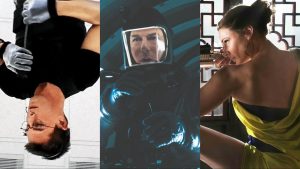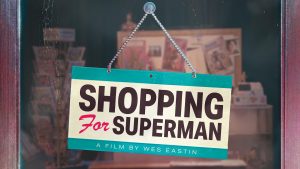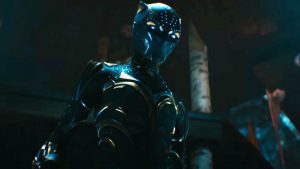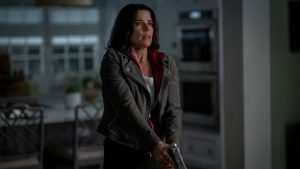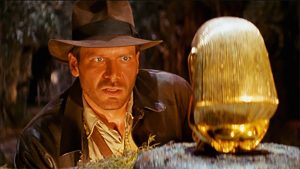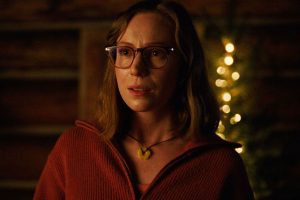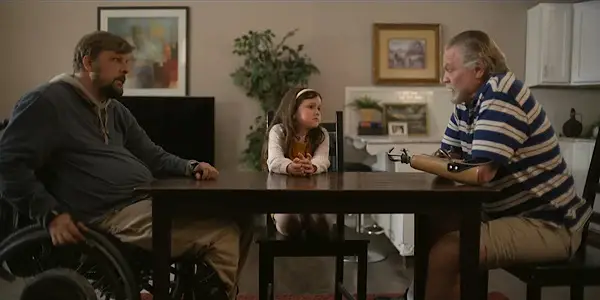
So tell us, how did you find your wonderful cast?
Alexander Yellen: Well, so when Kelly said we were going to cast authentically, I asked her, “Do you have any idea what’s out there?” And she said, “No, but we’re going to find out.” And we did a traditional casting call. So we went through breakdowns and we put out the proof of concept roles and got some great responses. We watched tape and we had callbacks. And interestingly, John read for the Robert role, which was written as a double amputee. The lead was originally written as a paraplegic and Tobias, who ultimately got the role, is a quad. He didn’t want to audition for it at first because he thought they were looking for a paraplegic. But he read it anyway. John and Toby know each other, they’re friends, and they read each other for auditions. John said, “Look, I’m just going to turn the camera around. Just read the other half of the scene because it was a scene together anyway.” And it just fell into place, and he was great.
Frankly, he was the best read we got. He was right for the role, so much so that we reworked parts of the script to work specifically with him and his physicality to make the role work. I’ve never looked at this as a disability film, and I don’t know that I’d be comfortable directing a disability film because that’s not where my expertise lies. All I had to do was worry about directing a dramedy, like a road trip, father-daughter, best-new-friend-found-family film. I really could lean on those guys to tell me if I was doing anything wrong or anything that didn’t feel authentic or natural; they would tell me. So it made my job easier. It was also very collaborative in that way.
John W. Lawson: Absolutely. What the collaboration to me was that it wasn’t that I had to educate him about disability because the role was just written, and honestly, being a cranky, old, poopoo head came very naturally to me. But no, it was an excellent opportunity for me to get a chance to show the world that people with disabilities are just like everybody else. We have feelings, we have emotions, and we can do this. We can drive cars. I’m actually a private pilot and a scuba diving instructor, and I’m the first-ever one in history to do that. But with “Daruma”, it was a chance for me to show that I could act more than just one line. There’s this really cool quote from former First Lady Michelle Obama. She said that for so many people, television and movies are the only way that other people understand people who aren’t like them. And that’s what “Daruma” is. We’re two different people, but we’re on an emotional and physical journey, locked in a car, forced to find out about each other and learn about each other, and the disabilities don’t play into it.
I love that. And so tell us a little bit about your character.
John W. Lawson: Well, Robert, as I foreshadowed earlier, is sort of the crotchety old neighbor, but we don’t know why. And as you go through this journey, he has a really cool arc in the film that you find out why he was that way. He’s next-door neighbors to Patrick, and without giving too much away, he sees Patrick making the same mistakes that he made, and he doesn’t want him to do that. So although they’ve had a contentious relationship living next door to each other with a driveway between them, now, when there’s nothing but a little seat between them in the car, they have to get along. It’s certainly a road trip film, but it’s more of an emotional trip film for the two characters. It’s a rescue story and a survival story, and both of those things make great drama. And with this script, you’re going to laugh some along the way too.
Perfect. I love to laugh. What’s Anna like? [Turns to Abigail]
Abigail Hawk: I played the character of Anna, who is the romantic lead. She’s fascinating to me because she clearly has been hurt. She’s got some personal trauma that she most likely hasn’t really overcome in the healthiest of ways. She’s just working this retail job in a child’s mattress store and living her dreams. She meets Patrick, who is Tobias Forrest’s character. The fascinating thing about Anna is that she is still so open-hearted. So she comes into this potential relationship with Patrick with her heart open and isn’t totally bitter and closed off to the idea of finding happiness as she continues to move forward as a person. She’s a little bit goth and a little punk, and definitely way tougher and cooler than I am. It was a fun time to play something totally different.
What was it about the script that caught your attention and made you say, “Oh, I really want to do it?”
Abigail Hawk: Originally, I planned to be an actor in it. I’ve known Alex for years and when they were fundraising for the film, I was very taken with the story and with the passion that they clearly both had for it. I had a niece who passed away a couple of years ago, who was severely physically and developmentally disabled, and just the idea of being able to see someone like her on screen in a way that wasn’t the reason you were seeing it was powerful to me. I loved that they had characters that were very flawed, very faulty. Patrick’s essentially a very unlikable dude, and yet, Tobias himself is so incredibly lovely and warm. So that was why I jumped in because I believed in the ideas behind it and the novelty of it.
I’d love to ask everybody kind of what you’re hoping audiences will take away from the film.
Alexander Yellen: I want people to walk away from this feeling really good. It’s a film that’s going to take you to some dark places, be uncomfortable to watch, but at the end, you see, I don’t want to give the ending away, but it’s joyful and it’s earned. Every character in this film gets the ending that they deserve, and I think it’s very satisfying. So if people could come away satisfied, I’ll be very happy.
John W. Lawson: My hope for the film is that by the end of it, you don’t even think about the characters’ disabilities anymore. Everybody finds a way to relate to this film. Everybody feels something. In the screenings we’ve had, there’s a moment where I hear the audience react, and I know that they’re experiencing the exact thing that I want them to experience. If they can humanize everybody in the film and relate to the emotion, then I’ve done everything I ever wanted to do with it and walk away happy.
Kelli McNeil: Daruma is not a moral lesson movie. It’s about emotional disability, if you want to put it that way. I hope it has a heart that everyone can relate to, and everyone will take something different from this. It could even work to help heal some relationships happening in other people’s lives. It’s never too late. Forgiveness is a big part of it, redemption, and just understanding that we’re all human, we all have our own specific journeys. Art is cool like that.
Art is cool. That’s a perfect way to close this.
John W. Lawson: Art is cool.
Interviewer: Thank you so much. Congratulations on the film. I’m sure this has been a whirlwind.
Alexander Yellen, John W. Lawson, Kelly MCNeil, Abigail Hawk: Thank you so much!
We’d like to thank everyone involved with Daruma for speaking with us!
Does content like this matter to you?
Become a Member and support film journalism. Unlock access to all of Film Inquiry`s great articles. Join a community of like-minded readers who are passionate about cinema – get access to our private members Network, give back to independent filmmakers, and more.

